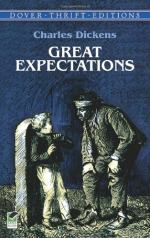Whatever night-fancies and night-noises crowded on me, they never warded off this don’t go home. It plaited itself into whatever I thought of, as a bodily pain would have done. Not long before, I had read in the newspapers, how a gentleman unknown had come to the Hummums in the night, and had gone to bed, and had destroyed himself, and had been found in the morning weltering in blood. It came into my head that he must have occupied this very vault of mine, and I got out of bed to assure myself that there were no red marks about; then opened the door to look out into the passages, and cheer myself with the companionship of a distant light, near which I knew the chamberlain to be dozing. But all this time, why I was not to go home, and what had happened at home, and when I should go home, and whether Provis was safe at home, were questions occupying my mind so busily, that one might have supposed there could be no more room in it for any other theme. Even when I thought of Estella, and how we had parted that day for ever, and when I recalled all the circumstances of our parting, and all her looks and tones, and the action of her fingers while she knitted — even then I was pursuing, here and there and everywhere, the caution Don’t go home. When at last I dozed, in sheer exhaustion of mind and body, it became a vast shadowy verb which I had to conjugate. Imperative mood, present tense: Do not thou go home, let him not go home, let us not go home, do not ye or you go home, let not them go home. Then, potentially: I may not and I cannot go home; and I might not, could not, would not, and should not go home; until I felt that I was going distracted, and rolled over on the pillow, and looked at the staring rounds upon the wall again.
I had left directions that I was to be called at seven; for it was plain that I must see Wemmick before seeing any one else, and equally plain that this was a case in which his Walworth sentiments, only, could be taken. It was a relief to get out of the room where the night had been so miserable, and I needed no second knocking at the door to startle me from my uneasy bed.
The Castle battlements arose upon my view at eight o’clock. The little servant happening to be entering the fortress with two hot rolls, I passed through the postern and crossed the drawbridge, in her company, and so came without announcement into the presence of Wemmick as he was making tea for himself and the Aged. An open door afforded a perspective view of the Aged in bed.
“Halloa, Mr. Pip!” said Wemmick. “You did come home, then?”
“Yes,” I returned; “but I didn’t go home.”
“That’s all right,” said he, rubbing his hands. “I left a note for you at each of the Temple gates, on the chance. Which gate did you come to?”
I told him.
“I’ll go round to the others in the course of the day and destroy the notes,” said Wemmick; “it’s a good rule never to leave documentary evidence if you can help it, because you don’t know when it may be put in. I’m going to take a liberty with you. — Would you mind toasting this sausage for the Aged P.?”




